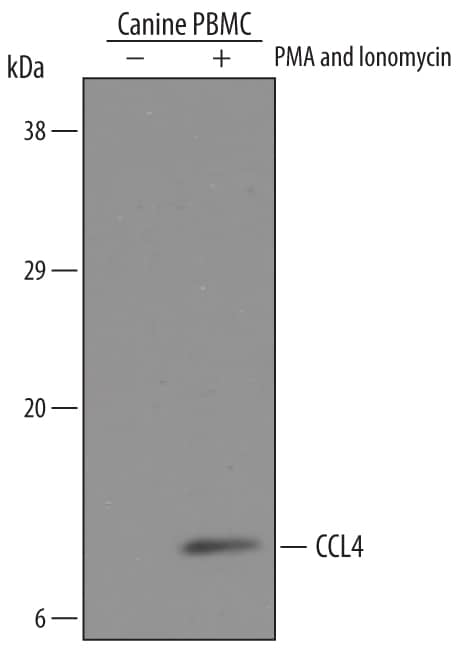Canine CCL4/MIP-1 beta Antibody
R&D Systems, part of Bio-Techne | Catalog # AF5839

Key Product Details
Validated by
Biological Validation
Species Reactivity
Canine
Applications
Immunocytochemistry, Western Blot
Label
Unconjugated
Antibody Source
Polyclonal Sheep IgG
Product Specifications
Immunogen
E. coli-derived recombinant canine CCL4/MIP‑1 beta
Ala24-Asn92
Accession # NP_001005250
Ala24-Asn92
Accession # NP_001005250
Specificity
Detects canine CCL4/MIP‑1 beta in direct ELISAs and Western blots. In direct ELISAs, approximately 10% cross-reactivity with recombinant human CCL4/MIP‑1 beta and recombinant mouse CCL4/MIP‑1 beta is observed and less than 1% cross-reactivity with recombinant viral CCL4/MIP‑1 beta is observed.
Clonality
Polyclonal
Host
Sheep
Isotype
IgG
Scientific Data Images for Canine CCL4/MIP-1 beta Antibody
Detection of Canine CCL4/MIP‑1 beta by Western Blot.
Western blot shows lysates of canine peripheral blood mononuclear cells (PBMC) untreated (-) or treated (+) with 5 µg/mL PMA and 500 ng/mL Ionomycin overnight. PVDF Membrane was probed with 1 µg/mL of Canine CCL4/MIP-1 beta Antigen Affinity-purified Polyclonal Antibody (Catalog # AF5839) followed by HRP-conjugated Anti-Sheep IgG Secondary Antibody (Catalog # HAF016). A specific band was detected for CCL4/MIP-1 beta at approximately 12 kDa (as indicated). This experiment was conducted under reducing conditions and using Immunoblot Buffer Group 8.Applications for Canine CCL4/MIP-1 beta Antibody
Application
Recommended Usage
Immunocytochemistry
5-15 µg/mL
Sample: Immersion fixed canine peripheral blood mononuclear cells
Sample: Immersion fixed canine peripheral blood mononuclear cells
Western Blot
1 µg/mL
Sample: Canine peripheral blood mononuclear cells (PBMC) treated with PMA and Ionomycin
Sample: Canine peripheral blood mononuclear cells (PBMC) treated with PMA and Ionomycin
Formulation, Preparation, and Storage
Purification
Antigen Affinity-purified
Reconstitution
Reconstitute at 0.2 mg/mL in sterile PBS. For liquid material, refer to CoA for concentration.
Formulation
Lyophilized from a 0.2 μm filtered solution in PBS with Trehalose. *Small pack size (SP) is supplied either lyophilized or as a 0.2 µm filtered solution in PBS.
Shipping
Lyophilized product is shipped at ambient temperature. Liquid small pack size (-SP) is shipped with polar packs. Upon receipt, store immediately at the temperature recommended below.
Stability & Storage
Use a manual defrost freezer and avoid repeated freeze-thaw cycles.
- 12 months from date of receipt, -20 to -70 °C as supplied.
- 1 month, 2 to 8 °C under sterile conditions after reconstitution.
- 6 months, -20 to -70 °C under sterile conditions after reconstitution.
Background: CCL4/MIP-1 beta
References
- Rot, A. and U.H. von Andrian (2004) Annu. Rev. Immunol. 22:891.
- Menten, P. et al. (2002) Cytokine Growth Factor Rev. 13:455.
- Sun, X. et al. (2006) Infec. Immun. 74:5943.
- Bisset, L.R. and P. Schmid-Grendelmeier (2005) Curr. Opin. Pulm. Med. 11:35.
- Frangogiannis, N.G. (2004) Inflamm. Res. 53:585.
- Bystry, R.S. et al. (2001) Nat. Immunol. 2:1126.
- Oliveira, S.H.P. et al. (2002) J. Leukoc. Biol. 71:1019.
- Schall, T.J. et al. (1993) J. Exp. Med. 177:1821.
- Guan, E. et al. (2001) J. Biol. Chem. 276:12404.
- Guan, E. et al. (2002) J. Biol. Chem. 277:32348.
- Guan, E. et al. (2004) J. Cell. Biochem. 92:53.
Alternate Names
Exodus-3, MIP-1 beta, MIP1 beta
Entrez Gene IDs
Gene Symbol
CCL4
UniProt
Additional CCL4/MIP-1 beta Products
Product Documents for Canine CCL4/MIP-1 beta Antibody
Product Specific Notices for Canine CCL4/MIP-1 beta Antibody
For research use only
